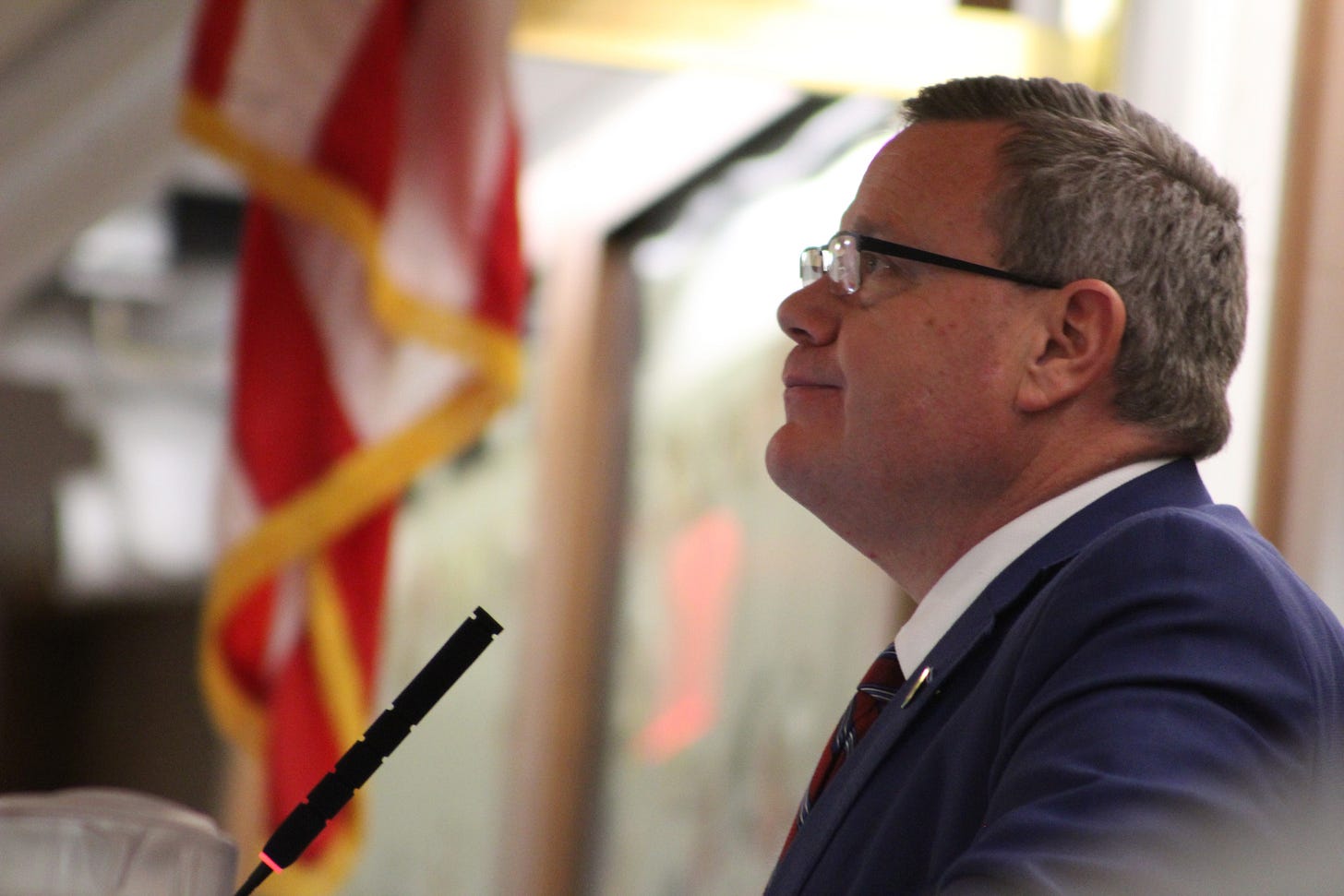NC lawmakers approve bill stripping incoming statewide Democrats of key powers
In a drama-filled day, North Carolina Republicans on Wednesday gave final approval for Senate Bill 382.

Incoming statewide Democrats stand to lose many powers under a sweeping 131-page bill that received final legislative approval on Wednesday.
Senate Bill 382 cleared the House in a final, party-line override vote of 72-46, with Democratic Reps. Cecil Brockman and Joe John absent and Republican Reps. Mike Clampitt, Karl Gillespie and Mark Pless (who all voted against the original bill) supporting the override. The measure shuffles around $227 million toward Hurricane Helene relief, but doesn’t spend it, prompting backlash from a handful of GOP lawmakers in western North Carolina. An additional $25 million is set aside for debris cleanup.
In a drama-filled day with some arm twisting behind scenes, Republicans got the measure across the finish line over the objection of Democratic Gov. Roy Cooper.
Vote Breakdown
Reps. Mike Clampitt, Karl Gillespie and Mark Pless, who all opposed the initial floor vote ultimately voted in favor of the override.
Clampitt and Gillespie declined to explain their reasoning on the overrides.
Pless said he reached a final decision Wednesday afternoon after speaking with Rep. Destin Hall, Sen. Ralph Hise and Congressman Chuck Edwards over the past 24 hours. Through those conversations, Pless said he got enough reassurance that there’d be more relief that would soon head to western North Carolinians.
“They have assured me that we're going to be able to move some federal money and some state money into western North Carolina to help people move forward, and that was the ultimate goal,” Pless said.
Pless added that he struck no deal with leadership.
“I haven't asked for anything. They haven't offered anything,” Pless said. “It's not really the timing for that. Any committees or anything that was done would have ended at the end of this year. Chairman Hall, if he becomes the speaker, that'll be a decision for him to make coming into the new year.”
House Speaker Tim Moore confirmed no deals were struck, but told reporters political pragmatism has helped keep a 72-member caucus together.
“Nobody got threatened, but it doesn’t take too many people to realize that, if they vote against something that’s clearly a Republican ideal, that might be a problem in a primary,” Moore said.
John announced he missed Wednesday’s vote due to ongoing treatment he was receiving to address a recent throat cancer diagnosis. “The demands of my treatment unfortunately prevent me from attending today's vote,” he said in a statement.
Brockman’s office didn’t respond to a request for comment on his absence.
After initially saying he knew of no Democrats who would miss Wednesday’s vote, House Democratic Leader Robert Reives downplayed Brockman’s absence in a news conference with reporters following the vote.
“We knew where Cecil was,” Reives said. “Once those guys [Clampitt, Gillespie and Pless] decided they weren’t going to break, there was no need for anybody [on the Democratic side] to be here.”
Shortly after the vote, protests erupted in the gallery, leading to one arrest.
Fiery debate
Cooper and a number of Democrats see the bill as an unconstitutional power grab that does little to support hurricane recovery.
“Western North Carolina small businesses and communities still wait for support from the legislature while Republicans make political power grabs the priority,” Cooper said in a statement. “Shameful.”
Rep. Eric Ager, a Buncombe County Democrat, said the bill falls dramatically short in helping everyday residents.
“It’s been three months. We should’ve done more sooner,” Ager said. “The people of North Carolina are tired of hearing help is on the way. And it’s not coming.”
Rep. Dudley Greene, an Avery County Republican, told an emotional story of him and his family seeking shelter during the hurricane. He took exception to the notion of help not coming, noting the community response has brought people together and Republicans have passed two initial waves of relief that has not yet been fully spent.
“I’ve heard help’s not coming,” Greene said. “It has been there in western North Carolina. … To say we’re not doing anything, we’ve done it. And continue to do it. We’ve allocated money that hasn’t even had time to be spent.”
Republicans argue the bill will indeed pass constitutional muster when it faces an inevitable legal challenge. A particularly notable provision shifts State Board of Elections appoint power from the Democratic governor to an incoming Republican state auditor.
“The bill isn’t about politics,” said Hall, referencing a measure GOP lawmakers proposed earlier this session to create an evenly split state elections board.
Hall added, “The constitution gives this body the ability to make certain decisions. … and that’s what we’ve done in this bill.”
He also referenced a desire by lawmakers to maximize the amount of federal spending the state receives and to take time to properly assess the damage in western North Carolina.
“You can send all the world to immediately, but you need to go and figure out where the need lies,” Hall said, adding that there will be “much more” in storm relief to come.
House Democratic Leader Robert Reives clapped back.
“What I’ve heard is a focus on politics, and I am disappointed sorely,” Reives said. “I am sorry to the people of western North Carolina that we didn’t take the opportunity today to do the right thing: to do right by you.”
What’s in the bill?
Here are some of the policy ramifications of the bill:
Prevents Gov.-elect Josh Stein from appointing members onto the State Board of Elections by transferring that authority over to Republican Auditor-elect Dave Boliek.
Makes the State Highway Patrol an independent agency and requires Stein to get the General Assembly’s approval for a five-year appointment
If a Supreme Court or Court Appeals vacancy emerges, Stein must fill it from a list of recommendations provided by the political party of the departing judge, thus preventing him from filling a potential GOP vacancy with a Democrat.
Removes the seats of Wake County Superior Court Judge Bryan Collins and Forsyth County Superior Court Judge Todd Burke. Collins and Burke have ruled against election law changes that GOP lawmakers have put forward over the years.
Prohibits Attorney General-elect Jeff Jackson from participating in lawsuits that undercut actions taken by the General Assembly. The bill says Jackson “shall not, as a party, amicus, or any other participant in an action pending before a state or federal court in another state, advance any argument that would result in the invalidation of any statute enacted by the General Assembly.”
Prevents Lt. Gov.-elect Rachel Hunt from chairing committees on energy issues. The bill also eliminates the Energy Policy Council, which has been chaired by the lieutenant governor.
Prevents Democratic Superintendent of Public Instruction-elect Mo Green from appealing decisions made by the Charter Schools Review Board.
Reduces the timeframe voters can “cure” their provisional ballots from nine days to three days. Provisionals tend to favor Democratic candidates and proved essential to Supreme Court Justice Allison Riggs’ efforts to overtake the lead of Republican Court of Appeals Judge Jefferson Griffin.





Did anybody doubt they'd fold?